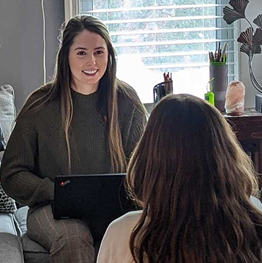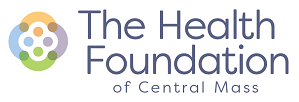
Laura Polizoti, a family intervention specialist at Youth Villages talking with “Haley”
Photo credit: Youth Villages
A recent story produced by NPR’s health reporting partnership with Boston’s WBUR and Kaiser Health News examined the youth boarding crisis at hospital Emergency Departments (EDs) in Massachusetts and nationwide, highlighting an innovative approach called ED diversion that could be a model for other states. Youth Villages, recipient of a 2022 Activation Fund grant from The Health Foundation of Central Massachusetts, is one of four agencies contracted by the state to offer related services, such as intensive in-home counseling and support, as an alternative to inpatient psychiatric treatment.
To gain deeper insight on the topic of “ED boarding,” WBUR’s Martha Bebinger joined Youth Villages staff for visits with teens and their families who have experienced the life-saving impact of the program first-hand.
ED boarding occurs when individuals go to a hospital ED in a mental health crisis and experience waiting periods of days or weeks before being admitted in a psychiatric unit due to a lack of available beds. According to a report by the Massachusetts Health and Hospital Association, the problem has been growing in Massachusetts and across the country for years and has been exacerbated by the effects of the pandemic and increased need for behavioral health services. As many as 247 children and teens were boarding in Massachusetts EDs as of March 2022. Numbers have decreased since then, and early results indicate that ED diversion programs like the one operated by Youth Villages are working— keeping youth safe while helping families avoid costly inpatient treatment and providing relief for overburdened hospital staff.
The Youth Villages model, Intercept for ED Diversion, was adapted from a well-established program for foster children that has undergone rigorous evaluation at the University of Chicago, validating the clinical model and evaluation methods. It involves a partnership with hospitals for referrals followed by development of a personalized treatment plan, which could include outpatient treatment, intensive in-home support for a minimum of 90 days, including 24/7 crisis response, and connection to other community resources as needed. The program began in 2021 as a pilot project with one hospital in the southeast region of Massachusetts, and has grown to serve youth statewide through 22 hospitals in less than two years.
In September 2022, the Foundation awarded Youth Villages an Activation Fund grant of $68,000 for upfront costs associated with hiring and training staff to expand the capacity of its Intercept for ED Diversion program in Central Massachusetts. The organization reports that this funding has enabled it to double the number of youth served through the program in Worcester County on a daily basis. This year, Youth Villages was among 11 organizations selected by the Office of the Attorney General to receive grants totaling $2.9 million for mental health diversionary services.
“We are incredibly proud of the success this program has seen and are hopeful for sustained funding that will help us provide children and families with the treatment they need in their own homes. The program not only helps change families’ course of involvement with the behavioral health system by avoiding unnecessary out of home placements, but also realizes cost savings to the system overall. We want to help as many children and families in Massachusetts as possible,” said Matt Stone, Executive Director of Youth Villages Massachusetts and New Hampshire.
“This grant to Youth Villages is an excellent example of the type of support the Activation Fund is designed to offer, which is to help an organization increase its capacity to improve health in a way that can be sustained over time,” said Dr. Amie Shei, President and CEO of the Foundation. “The Foundation is pleased to be able to support this innovative program which is having a direct impact on youth and families in Central Massachusetts.”
Now accepting applications for the 2023 grant cycle, the Activation Fund provides support for discrete projects aimed to help community organizations build capacity and/or enhance effectiveness. While the Foundation defines health broadly and does not name priority issues, it has a long history of investing in mental and behavioral health given the great need, and it has provided more than $6.9 million in grants to organizations working to address mental health needs in children and adults since 2000.
For more information on the Activation Fund and past grants, please click here.
